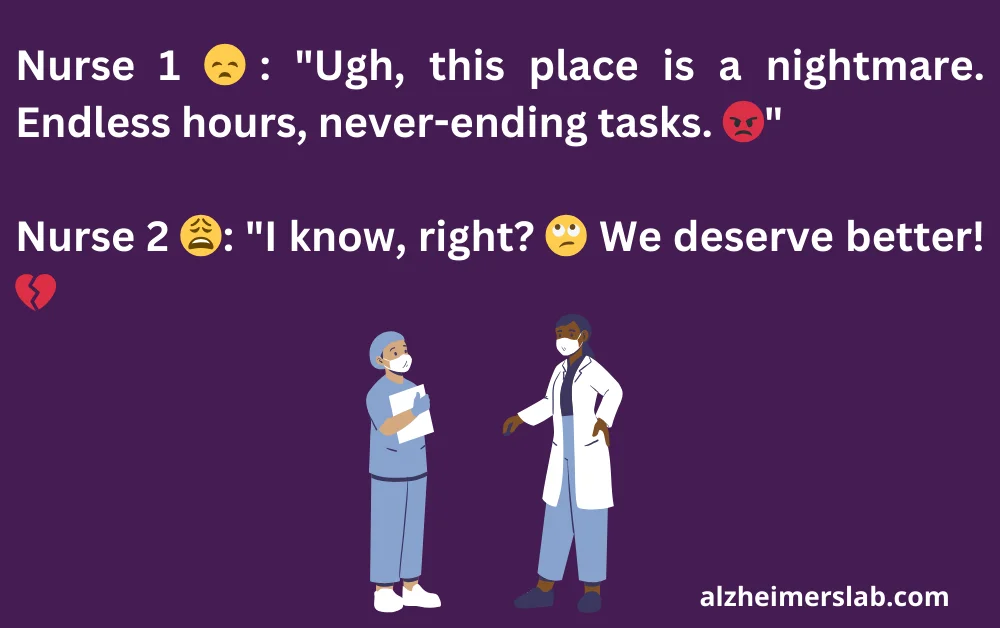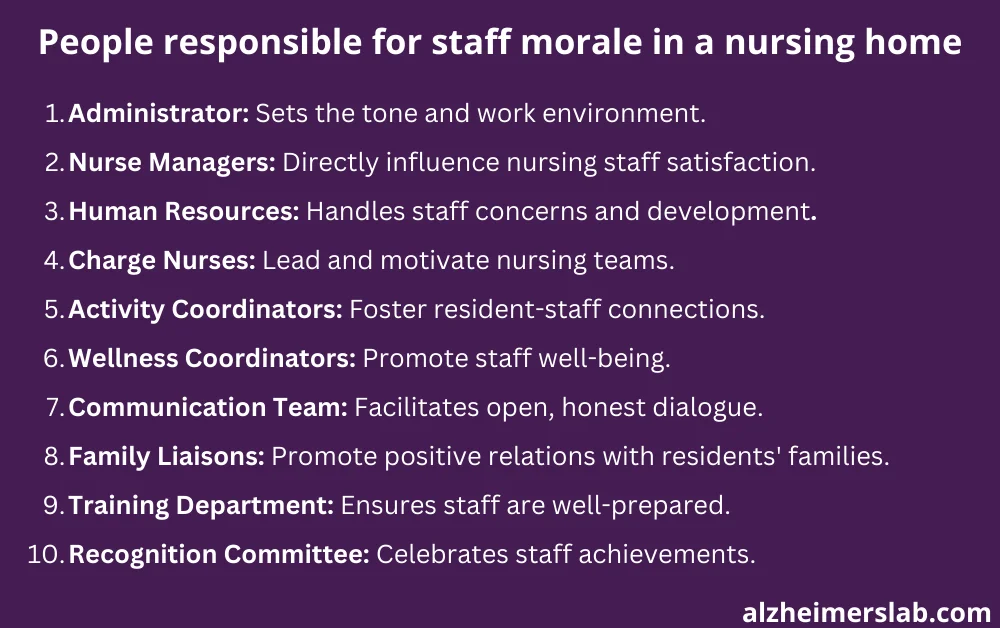How to Improve Staff Morale in Nursing Homes
Have you ever wondered what makes a nursing home a warm and caring place? Well, the secret often lies in the happiness and morale of its staff. You see, the people who work in nursing homes play a vital role in providing quality care to our elderly loved ones. So, when they’re happy and motivated, it reflects positively on the residents’ well-being. In this blog post, I’m going to share some practical and easy-to-implement tips on how we can improve staff morale in nursing homes.
What is the current situation of nursing home staff? Are they happy with the work-life balance offered by their employers?

Nursing home staff in the United States are facing some challenges when it comes to their work-life balance. Many of them work hard to take care of our elderly loved ones, but they often struggle to find the right balance between their jobs and personal lives.
One of the biggest issues is the long hours that many nursing home staff are required to work. They often have to put in extra hours to ensure that residents receive the care they need. This can be tough because it means less time for their families and themselves. Imagine having to work late into the night when you’d rather be at home with your family or doing something you enjoy.
Additionally, the workload for nursing home staff can be very demanding. They have to assist residents with various tasks, like bathing, dressing, and taking medication. It’s not an easy job, and it can be physically and emotionally draining. Some staff members might feel overwhelmed by the workload, which can affect their overall happiness with their job.
Another concern for nursing home staff is the pay. Many of them do not earn high wages for the important work they do. Low wages can make it difficult to make ends meet and provide for their families. This financial stress can add to their unhappiness and make it even harder to achieve a good work-life balance.
On a more positive note, some nursing homes are trying to improve the situation. They are offering more flexible schedules to their staff, which can help them have more time for themselves and their families. They are also working to increase wages to attract and retain qualified workers.
In conclusion, the current situation of nursing home staff in the United States when it comes to work-life balance is a mixed bag. Many face challenges due to long hours, heavy workloads, and low pay.
Why is staff morale important in a nursing home?
Staff morale is super important in nursing homes. You might wonder why. Well, let’s break it down.
Firstly, happy staff means happy residents. When the people who take care of residents are feeling good, they can provide better care. It’s like when you’re in a good mood, you do things better. If staff feel appreciated and content, they’ll be more likely to smile, be patient, and give the best care they can.
Secondly, low morale can lead to high turnover. Imagine if people kept leaving their jobs at the nursing home. That would be tough for residents who like familiar faces. Plus, it takes time to train new staff, and that can disrupt the routine. When staff morale is high, they’re more likely to stick around, and that’s good for everyone.
Moreover, when staff morale is low, it can affect teamwork. In a nursing home, teamwork is crucial. Staff need to work together smoothly to provide the best care. If morale is down, it can lead to conflicts and make it harder to get things done.
Another reason is that residents can feel when staff are unhappy. They’re like little mood detectors. If staff are stressed or unhappy, residents might pick up on that negative energy. This can make them feel anxious or uneasy. But when staff are happy and positive, it creates a better atmosphere for everyone.
Lastly, good staff morale can lead to better quality care. Happy staff are more likely to pay attention to detail, follow safety protocols, and be proactive. They’ll also be more motivated to keep learning and improving their skills. All of this adds up to a higher standard of care for residents.
Cheat sheet for improving staff morale in nursing homes
| Aspect | Action |
|---|---|
| Leadership | – Ensure a supportive and positive work environment. |
| – Listen to staff concerns and address them promptly. | |
| – Provide necessary resources and staffing levels. | |
| – Recognize and appreciate staff contributions. | |
| Nursing Staff | – Encourage friendly and supportive interactions. |
| – Promote empathy and patience when dealing with residents. | |
| – Address work-related stress and offer support. | |
| Aides/Assistants | – Foster a culture of teamwork and mutual assistance. |
| – Acknowledge their hard work and dedication. | |
| – Provide opportunities for skill development. | |
| Training | – Offer regular training to improve skills and knowledge. |
| – Ensure staff understand their roles and responsibilities. | |
| Communication | – Establish clear channels for staff to voice concerns. |
| – Encourage open and honest feedback. | |
| – Share important information and updates. | |
| Residents & Families | – Strive for high-quality care and satisfaction. |
| – Encourage residents and families to express appreciation. | |
| Recognition | – Implement an employee recognition program. |
| – Celebrate achievements and milestones. | |
| – Provide verbal praise and written commendations. | |
| Work-Life Balance | – Promote reasonable work hours and breaks. |
| – Support staff in maintaining a healthy work-life balance. | |
| Incentives | – Offer incentives like bonuses or extra time off. |
| – Create a fair and competitive compensation structure. | |
| Professional Growth | – Provide opportunities for career advancement. |
| – Encourage ongoing education and certifications. | |
| Wellness Programs | – Offer wellness initiatives to promote physical and mental health. |
| – Organize stress-relief activities and counseling if needed. | |
| Feedback Loop | – Continuously gather and act upon staff feedback. |
| – Regularly assess morale and make necessary improvements. |
Who is responsible for staff morale in a nursing home?

In a nursing home in the United States, keeping the staff happy and motivated is super important. But who’s in charge of making sure that happens? Well, it’s a team effort!
First off, the boss, usually called the administrator, plays a big role. They need to create a positive work environment. That means making sure everyone has the tools they need to do their job well and making sure there are enough staff members to handle the workload. They also need to listen to any concerns or problems the staff might have and try to find solutions.
The nurses are a big part of the morale puzzle too. They’re the ones who work directly with the residents, so if they’re happy and motivated, it can make a big difference. They can do simple things like being friendly and supportive to their coworkers, and also to the residents. If the nurses are stressed or unhappy, it can affect everyone around them.
Don’t forget about the aides and assistants. They’re the ones helping with daily tasks like bathing and dressing residents. They also spend a lot of time with the residents, so they need to be happy and friendly too. They need to get support and recognition for their hard work.
Training and communication are key ingredients too. If staff members don’t know what’s going on or aren’t sure how to do their job, it can lead to frustration. That’s why the nursing home needs to provide training and clear guidelines.
Lastly, the residents and their families can also play a role in staff morale. When residents and their families are happy with the care they’re receiving, it can boost the spirits of the staff. Their appreciation and kind words can make a big difference in how the staff feel about their work.
10 Things a Nursing Home Executive Director or a Nursing Home Administrator can say to boost staff morale
Boosting staff morale is essential for any nursing home executive director or administrator. Here are ten things they can say to uplift their staff:
“Thank You“: Express genuine gratitude for their hard work and dedication.
“Your Efforts Matter“: Remind them that their daily contributions make a significant impact on residents’ lives.
“I’m Here to Support You“: Let them know you’re available to help with any challenges they face.
“Your Feedback is Valuable“: Encourage open communication and welcome their input for improvement.
“We’re a Team“: Emphasize the importance of teamwork and unity within the facility.
“Your Professional Growth Matters“: Show your commitment to their career development within the organization.
“Work-Life Balance is a Priority“: Reiterate the importance of maintaining a healthy work-life balance.
“Your Safety is Important“: Assure them that their safety and well-being are a top priority.
“I Believe in You“: Express confidence in their abilities to overcome challenges.
“Let’s Celebrate Successes“: Acknowledge achievements, both big and small, to boost morale and motivation.
These simple yet powerful statements can go a long way in creating a positive and motivating work environment in nursing homes.
Conclusion
Improving staff morale in nursing homes is not just about making the workplace better for them; it’s about enhancing the quality of care our elderly residents receive. It’s a win-win situation.
So, here’s my question to you: What simple steps can we take in our daily lives to improve staff morale in nursing homes? Share your thoughts and ideas in the comments below. Let’s create a community of support and positivity!
Remember, a happy staff member can make a world of difference in the lives of those they care for. Let’s make that difference together.
